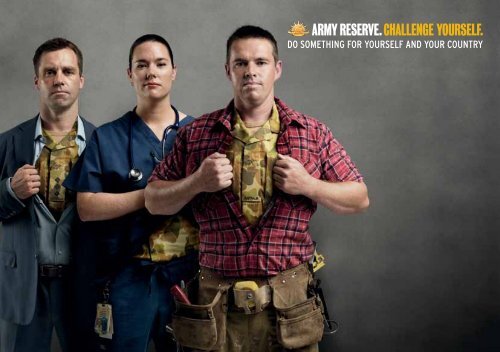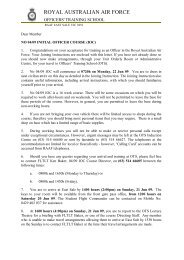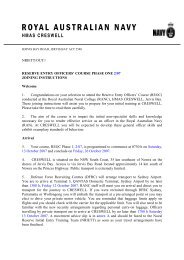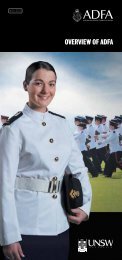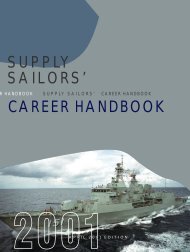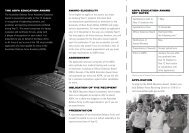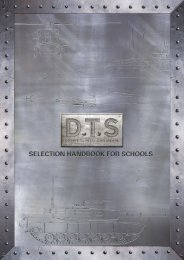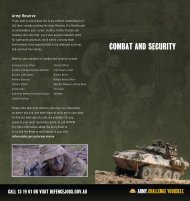Army Reserve Information - Australian Defence Force Recruiting
Army Reserve Information - Australian Defence Force Recruiting
Army Reserve Information - Australian Defence Force Recruiting
Create successful ePaper yourself
Turn your PDF publications into a flip-book with our unique Google optimized e-Paper software.
1<br />
DO SOMETHING FOR YOURSELF AND YOUR COUNTRY
A UNIQUE PART-TIME EXPERIENCE.<br />
Imagine doing a part-time job that you actually enjoy. A job that’s<br />
both worthwhile to you and important to the community... a job<br />
you’re doing not just for the money. Well, you’ve just described the<br />
<strong>Army</strong> <strong>Reserve</strong>. Most people you talk to in the <strong>Reserve</strong>s will tell<br />
you that although they earn tax-free money from their <strong>Reserve</strong><br />
job, that’s not the reason they do it. It’s a great testament to the<br />
rewarding nature of a job in the <strong>Army</strong> <strong>Reserve</strong>. It offers<br />
you the chance to get involved in exciting outdoor activities, work<br />
in a strong team atmosphere, train on high-tech equipment, build<br />
up personal skills, meet great friends, have fun, and get fit.<br />
These are just some of the reasons why over 16,000<br />
<strong>Australian</strong>s are part of the <strong>Army</strong> <strong>Reserve</strong>.<br />
1
ARMY RESERVE IS ABOUT<br />
GIVING YOU CHOICES.<br />
For years, the <strong>Army</strong> <strong>Reserve</strong> has played a vital role in defending<br />
Australia. The <strong>Army</strong> <strong>Reserve</strong> trains and works right alongside<br />
the full-time <strong>Army</strong>.<br />
They work in the same fields and also in specialised areas not<br />
covered in the full-time <strong>Army</strong>. As an <strong>Army</strong> Reservist you may even<br />
have the chance, if you choose, to be involved in overseas service.<br />
Recently, <strong>Army</strong> <strong>Reserve</strong> soldiers served with peace-keeping forces<br />
in East Timor. Others were involved in operations and training in the<br />
Solomon Islands, Papua New Guinea and Sudan.<br />
One of the advantages of pursuing a part-time role with the <strong>Army</strong><br />
<strong>Reserve</strong> is its flexible approach to working hours. It is designed<br />
to fit in with your own work arrangements. The minimum serving<br />
period required to serve in the <strong>Reserve</strong> is 20 days a year.<br />
<strong>Army</strong> <strong>Reserve</strong> is flexible.<br />
We realise there will inevitably be times when your <strong>Reserve</strong><br />
activities will clash with other work, study, social, sporting, or family<br />
commitments. If, for example, you have exams or have to play in<br />
the local football final, it’s possible to organise time-off with your<br />
supervisor. The <strong>Army</strong> <strong>Reserve</strong> will try to work with you so you<br />
can continue to enjoy the life you lead now, as well as enjoy the<br />
opportunities and benefits the <strong>Army</strong> <strong>Reserve</strong> has to offer.<br />
<strong>Army</strong> <strong>Reserve</strong> is local.<br />
While it’s true you may get the chance to travel with the <strong>Reserve</strong>s,<br />
the majority of <strong>Army</strong> Reservists join for precisely the opposite<br />
reason – the <strong>Army</strong> <strong>Reserve</strong> is a great way to experience <strong>Army</strong> life<br />
without working far from home. In most cases, you’ll find an <strong>Army</strong><br />
<strong>Reserve</strong> unit close by in your local community.<br />
2
Jobs in your Local Unit.<br />
There are many different opportunities available in the <strong>Army</strong><br />
<strong>Reserve</strong> – jobs range from clerical and administrative roles to<br />
technical jobs in engineering or medicine, through to combat roles<br />
like infantry and artillery.<br />
It’s important to remember that the jobs available to you vary<br />
depending on where you live, and what type of units are in your<br />
area. Find out what jobs are available at your local <strong>Army</strong> <strong>Reserve</strong><br />
unit by calling 13 19 01.<br />
3
Officer or soldier<br />
There are two employment streams available within the<br />
<strong>Army</strong> <strong>Reserve</strong> – officers and soldiers.<br />
Officers are leaders. They play more of a role in decision-making<br />
and tactical thinking. They’re men and women with loyalty, courage,<br />
determination and integrity. They are examples to the soldiers they<br />
lead. To become an officer you’ll need to do extra training<br />
at the Royal Military College Duntroon (RMC, Canberra). If you join<br />
the <strong>Reserve</strong>s with qualifications in areas such as medical, dental,<br />
nursing, law or engineering, your officer training may be shorter.<br />
Your other option is to join as a soldier.<br />
HOW DO I KNOW WHAT<br />
JOB WILL SUIT ME<br />
There are a huge range of exciting jobs available in the <strong>Army</strong><br />
<strong>Reserve</strong>. The best way to find out about the jobs that might interest<br />
you is to come to a Your Opportunities Unlimited (YOU) Session.<br />
At a YOU Session, you will be tested to see what jobs you are best<br />
suited for, you can learn all about the tax-free pay and benefits<br />
and speak to a Careers Counsellor about the options available to<br />
you. You’ll be able to chat with serving <strong>Australian</strong> <strong>Defence</strong> <strong>Force</strong><br />
personnel and ask all the questions you want, before you join.<br />
Soldiers have the most hands on experience. Whether it’s patrolling<br />
through the jungle or setting up a remote communications post,<br />
soldiers carry out the everyday tasks and functions the <strong>Army</strong><br />
runs on. As a soldier you’ll play a critical part in a dedicated unit,<br />
working within a specialised team. Soldiers also have plenty of<br />
opportunity to move up the ranks into leadership roles as their<br />
careers progress.<br />
4
Soldiers: Initial Training.<br />
When you join the <strong>Army</strong> <strong>Reserve</strong> as a soldier, you’ll begin by<br />
completing <strong>Army</strong> recruit training. This is a 28-day continuous course<br />
at Kapooka, New South Wales (10 minutes out of Wagga Wagga),<br />
where you’ll be under the guidance of instructors.<br />
Training must be completed within six months of enlistment.<br />
All soldiers, both full-time and part-time, train at Kapooka.<br />
No-one is saying recruit training is a walk in the park. It isn’t.<br />
It’s hard. It’s challenging. Mostly, it’s very intense, but the course<br />
is designed to help you succeed, not fail. And when you do make it,<br />
it’s an amazing feeling. Of course, to become an effective soldier,<br />
you’ll need to develop specialist skills and a working knowledge of<br />
how today’s <strong>Army</strong> operates. You’ll learn about weapons, first aid,<br />
navigation, communications and surviving in the field.<br />
Not surprisingly, physical fitness is pretty important in the <strong>Army</strong>,<br />
and with the assistance of expert physical trainers, you’ll soon be fit<br />
to take on anything. At the end of initial training, your achievements<br />
will be recognised with a “March-out Ceremony.” Here you’ll<br />
be congratulated on your success. It’s a proud moment that<br />
you’re encouraged to share with your family and friends.<br />
5
Soldiers: Employment Training.<br />
After you have completed your training at Kapooka, the next step<br />
is your Initial Employment Training (IET).<br />
Kapooka will teach you to be a soldier, but your IET is where you<br />
learn the skills and crafts specific to the job or corps you‘ve chosen<br />
in the <strong>Army</strong> <strong>Reserve</strong>. For example, if you’re going to serve in the<br />
Signals Corps, this is where you learn how to be a Signaller, training<br />
in areas such as radio operating procedure, communication<br />
equipment, frequency theory and encryption methods.<br />
This training will usually occur in your local region, but you may be<br />
required to travel interstate. In most cases, it takes between two<br />
and seven weeks.<br />
You can do your IET in one block or break it up into several<br />
modules, but you must complete it within 18 months. Once you<br />
finish, you’ll be a fully qualified soldier in your corps in the<br />
<strong>Army</strong> <strong>Reserve</strong>.<br />
6
officers: Initial Training.<br />
To become an officer in the <strong>Army</strong> <strong>Reserve</strong> you have to do a more<br />
extensive training program. This aims to give you the skills to think<br />
as a leader not only within the <strong>Army</strong> <strong>Reserve</strong>, but in any situation<br />
or environment.<br />
There are two types of officer categories within the <strong>Army</strong> <strong>Reserve</strong>,<br />
General Service Officers (GSO) and Specialist Service Officers (SSO).<br />
Specialist Service Officers are men and women who are<br />
civilian specialists in fields including legal, health, communications<br />
or engineering, and use these skills in their jobs as officers in the<br />
<strong>Army</strong> <strong>Reserve</strong>.<br />
If you join as a Specialist Service Officer you’ll do a two-week course<br />
in which you’ll learn the military skills required of a Specialist Officer<br />
in the <strong>Army</strong> <strong>Reserve</strong>.<br />
General Service Officers are trained by the <strong>Australian</strong> <strong>Defence</strong><br />
<strong>Force</strong> to operate and lead in one of the many <strong>Army</strong> Corps, including<br />
Ordnance, Armour, Infantry, Intelligence, and Signals.<br />
If you join as a General Service Officer your training will comprise of<br />
five modules, described on the following pages.<br />
Module 1: Military Foundation Skills is actually the <strong>Reserve</strong><br />
Recruit Training Course and will be conducted at Kapooka, near Wagga<br />
Wagga, NSW. Qualified soldiers who are selected to be officers may be<br />
granted recognition of this training and commence training at Module 2.<br />
Any officer candidate who decides they don’t wish to continue officer<br />
training can become a soldier when they complete this module.<br />
This module is 28 days long and is available several times each year.<br />
Module 2: Small Military Team Leader Theory takes<br />
16 days and is held during April and September in South Australia.<br />
This module builds on the skills learnt in Recruit Training and introduces<br />
new operational, weapons and navigation topics.<br />
7
Module 3: Small Military Team Leader takes 16 days during<br />
April and September at Singleton in NSW. This module introduces<br />
command, leadership and management and military administration skills.<br />
This module is also your first step in developing the leadership and<br />
management abilities you’ll need to successfully command soldiers in<br />
the <strong>Australian</strong> <strong>Army</strong>.<br />
Module 4: Team Command, Leadership and Management<br />
takes 16 days in January and July in Puckapunyal, Victoria. This module<br />
revises and tests what you will already have learnt about small team<br />
level operations as well as building your administrative abilities as a<br />
small team leader.<br />
Training in Your Unit<br />
When you’re not doing your residential module training you’ll attend<br />
parade nights and weekends organised by your home <strong>Army</strong> <strong>Reserve</strong> unit.<br />
The training staff there will help you prepare for the residential modules,<br />
revise the skills you learn as well as give you instruction and assessment<br />
on topics including navigation, fieldcraft, drill, training, military justice<br />
and written and oral communication.<br />
A record book will document your progress on these skills. There are also<br />
some additional requirements for training through external organisations.<br />
Module 5: All corps <strong>Army</strong> <strong>Reserve</strong> Platoon Commander is<br />
28 days long and held in January and July at RMC Duntroon in Canberra.<br />
This module confirms you have the attributes, skills and values of<br />
an officer in the <strong>Australian</strong> <strong>Army</strong>. It also confirms that you have the<br />
leadership, management, operational skills and knowledge that a junior<br />
officer needs to command a platoon on <strong>Army</strong> <strong>Reserve</strong> operations. When<br />
you successfully complete Module 5, you will be commissioned as a<br />
Lieutenant in the <strong>Army</strong> <strong>Reserve</strong>.<br />
8
once i’m qualified, what then<br />
In the <strong>Army</strong> we say that ‘the training never stops’. You’ll need to<br />
keep training to maintain your skills and develop new ones. However,<br />
once you’re a qualified soldier or officer, the time you’re required<br />
to train certainly does reduce.<br />
Travel.<br />
In the <strong>Army</strong> <strong>Reserve</strong> there’s often the chance to travel within<br />
Australia or overseas for training or operational service. The<br />
amount you travel really depends on the opportunities that arise,<br />
and your availability.<br />
Depending on local arrangements, you generally parade with your<br />
unit once a week, and usually on Tuesday nights. You’ll usually go away<br />
with them one weekend a month – this could be on a live training<br />
scenario or to maintain basic soldier skills such as weapons handling.<br />
Most units also run at least one two-week camp a year. These will<br />
probably be held in your local region. Occasionally you may be<br />
involved in a major exercise which can be held anywhere from<br />
Darwin to Tasmania and will give you an exciting opportunity to work<br />
alongside different units, corps and even the Navy and Air <strong>Force</strong>.<br />
Some of our reservists have travelled to places like Asia or<br />
Hawaii. Others prefer to stay close to home and only travel to<br />
complete their basic training.<br />
Many like to make themselves available during times of local<br />
emergency such as natural disasters.<br />
Every soldier will tell you that working with your local unit is<br />
enjoyable and rewarding. This is where you really start to do your<br />
job. Once you’ve completed your training you’ll be given greater<br />
responsibilities in your own <strong>Army</strong> <strong>Reserve</strong> unit. It’s a very<br />
satisfying feeling.<br />
Of course, during this time you’ll be earning tax-free pay.<br />
9
Tax-free pay.<br />
When you work in the <strong>Army</strong> <strong>Reserve</strong> your pay is tax-free.<br />
This means that everything you earn goes into your pocket.<br />
It’s great news for students because it won’t affect your Youth<br />
or Austudy allowance. Similarly, if you’re on social security,<br />
your <strong>Army</strong> <strong>Reserve</strong> earnings aren’t counted as income.<br />
Other benefits.<br />
You’ll discover even more benefits when you join the <strong>Reserve</strong>s<br />
– starting with not having to pay for any accommodation or food<br />
associated with meeting your training requirements or while<br />
on exercise.<br />
meet people.<br />
Another major benefit with the <strong>Army</strong> <strong>Reserve</strong> is that you can still<br />
enjoy your current social life, plus you get to meet new people and<br />
make new friends.<br />
You’ll also find that the excitement and adventure of being in<br />
the <strong>Army</strong> <strong>Reserve</strong> gives you a lot more self-confidence and the<br />
motivation to improve yourself and your life.<br />
Your uniform and equipment are free, including cooking equipment,<br />
wet weather gear, sleeping bag and back pack. Any travel you need<br />
to do for initial training or employment training is paid for.<br />
You may also qualify for tax-free Active <strong>Reserve</strong> Health Support<br />
Allowance and <strong>Defence</strong> Health Insurance.<br />
10
What about my day job<br />
Most employers are happy to have their staff join the <strong>Army</strong> <strong>Reserve</strong>.<br />
Your employer may even be eligible to receive a subsidy from the<br />
<strong>Army</strong> to compensate them financially for your absence. Government<br />
employers in particular are very understanding when it comes to<br />
the <strong>Army</strong> <strong>Reserve</strong>. The <strong>Defence</strong> <strong>Reserve</strong>s Support Council has<br />
been specifically set up to help you answer any questions your<br />
employer may have.<br />
You or your employer are welcome to contact a local unit for more<br />
specific information at any time.<br />
Fitness.<br />
Physical Training (PT) is a large part of <strong>Army</strong> life, and a key element<br />
of your Recruit Course.<br />
The <strong>Army</strong> understands that new recruits will have varying levels<br />
of individual fitness so they have developed a realistic PT program<br />
which allows for this. Over the 28 days of Recruit Training, you’ll<br />
work with qualified <strong>Army</strong> Physical Training Instructors to increase<br />
your core strength, cardio and endurance levels. The pace and<br />
expectations are challenging, yet achievable for everyone. When<br />
you apply for the <strong>Army</strong> <strong>Reserve</strong> you’ll need to pass a pre-enlistment<br />
fitness assessment to make sure you’re fit enough to undertake<br />
Recruit Training.<br />
THIS INCLUDES:<br />
A. Shuttle run/beep test to a standard of 7.5. In this you’ll shuttle<br />
back and forth over 20 metres, keeping up with a series of<br />
recorded beeps. The beeps begin slowly and gradually get faster.<br />
It works out to running 56 shuttles (a total of 1120 metres)<br />
in six minutes, 30 seconds.<br />
B. 45 sit-ups.<br />
C. 15 push-ups for males, 8 for females.<br />
11
Entry requirements.<br />
OFFICER<br />
If you want to join the <strong>Army</strong> <strong>Reserve</strong> as an officer, you’ll have to<br />
be at least 17 years old and an <strong>Australian</strong> citizen. You need to have<br />
successfully completed Year 12, with passes in English and three<br />
other subjects, or be a University student or graduate.<br />
soldier<br />
To join the <strong>Army</strong> <strong>Reserve</strong> as a soldier, you need to be at least 17<br />
years old and an <strong>Australian</strong> citizen. As a minimum, you’ll also need<br />
passes in Year 9 Mathematics and English.<br />
APPLICATION PROCESS.<br />
To apply go to defencejobs.gov.au/army/reserve or call 13 19 01.<br />
Once your application has been submitted and assessed, you will be<br />
invited to take part in a Your Opportunities Unlimited (YOU) Session.<br />
At a YOU Session you’ll have the opportunity to talk to a Careers<br />
Counsellor and sit an aptitude test to determine which jobs are best<br />
suited to you. You’ll undertake a psychological interview, medical<br />
assessment and <strong>Defence</strong> interview at the next stage – Interview<br />
and Assessment Day. If you are applying for an officer position,<br />
a selection panel of officers will then interview you and review<br />
your results at an Officer Selection Board. If you have successfully<br />
been recommended for a soldier or officer role you’ll then undergo<br />
a fitness assessment. On passing this last test you will then be<br />
enlisted into the <strong>Army</strong> <strong>Reserve</strong>.<br />
12
STILL NOT SURE TRY IT!<br />
If you still haven’t decided whether the <strong>Army</strong> <strong>Reserve</strong> is right for<br />
you, ask about one of our trial weekends or events, offered by some<br />
regional units. Obviously you won’t be doing everything a qualified<br />
soldier would do, but you’ll get a great taste of what <strong>Army</strong> training<br />
is like – in both a tactical and non-tactical environment.<br />
This may include camping out in hootchies, eating from ration packs,<br />
an introduction to field craft, observing qualified troops in training,<br />
and an introduction shoot in an <strong>Army</strong> Weapons Training Simulation<br />
System.<br />
If at the end of the weekend, you feel the <strong>Army</strong> <strong>Reserve</strong> is not for<br />
you, you’re under absolutely no obligation to continue.<br />
13
READY TO TAKE THE NEXT STEP<br />
If you’d like to apply or for more information, call 13 19 01<br />
or visit defencejobs.gov.au/army/reserve<br />
14
GPYR MDFA4102<br />
CALL 13 19 01 OR VISIT<br />
DEFENCEJOBS.GOV.AU/ARMY/RESERVE<br />
1


